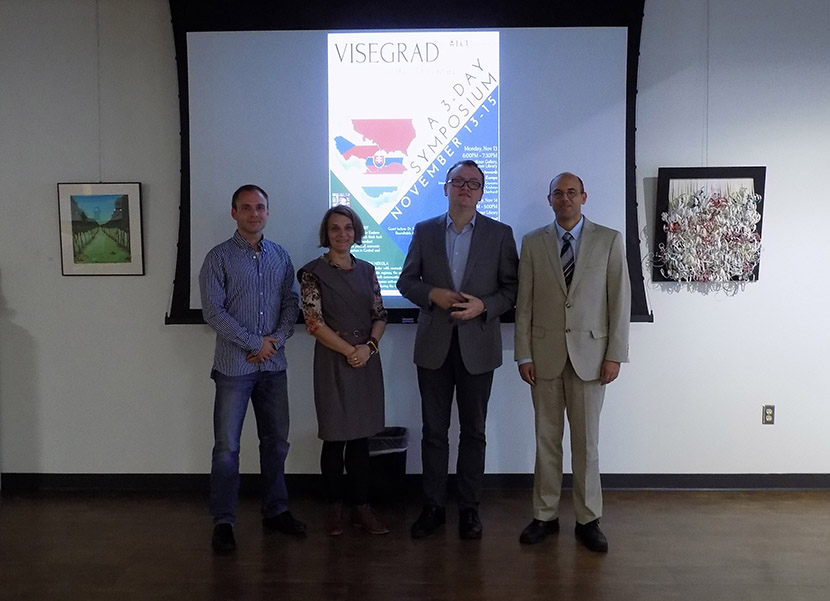Publisher's note: The author of this post, Lacey L. Gray, is a contributor to ECU News Services.
East Carolina University students and the local community recently had the opportunity to broaden their knowledge of foreign affairs and contribute to the international exchange of ideas and perceptions during a three-day symposium on central and eastern European politics.
The event, "Visegrad in the 21st Century," sponsored by a grant from the International Visegrad Fund, was hosted Nov. 13-15 by the Thomas Harriot College of Arts and Sciences Department of Political Science and the Office of Undergraduate Research.
Two guest speakers from Poland and Czechia - two of the four central European states that make up the Visegrád group (Czech Republic, Hungary, Poland and Slovakia), or Visegrád Four as they are also known - visited campus during the event.
The researchers presented on topics ranging from Polish-Russian relations and Russia's foreign policy towards central-eastern Europe, to the Visegrád States in a broader context and the Czech people's exile during the Cold War.
"Our overall goal was for ECU students to gain a deeper understanding of the challenges and transformations the east-central European states have experienced in the last 25 years of democratic transitions, European Union and NATO membership, as well as these states' changing foreign relations with Russia," said Dr. Magda Giurcanu, teaching assistant professor of political science, who helped organize the event.
On Monday, Dr. Adam Eberhardt, director of the Center for Eastern Studies, a Polish think tank that undertakes independent research on the political, economic and social situation in central and eastern Europe, predominantly discussed Russia's economy and foreign policy as well as Polish-Russian relations.
Eberhardt argued that Russia perceives the western European countries to be weak. However, Russia challenges the security of neighboring countries by asking for concessions without offering anything in return.
He also said there is little to no modernization because of the "law of the ruler," and after 17 years in power, President Putin has no desire to tackle the challenges to the Russian state.
"Russia is not the Soviet Union of the Cold War," said Eberhardt.

Drs. Nekola, Giurcanu, Eberhardt and Krishnan.
A roundtable discussion was held Tuesday afternoon with Eberhardt; ECU political science faculty Drs. Armin Krishnan and Giurcanu; and Dr. Martin Nekola, an independent scholar from Prague, whose research focuses on non-democratic regimes, the era of Communism, Czech communities abroad and the east-European, anti-communist exiles to the United States during the Cold War.
On Wednesday, Nekola gave a presentation on his research pertaining to the Czech migration, which began Feb. 20, 1948 and lasted until 1989. Many researchers disagree on the total number of Czech citizens who fled Czechia, but Nekola said 250,000 seems to be a realistic number. Many of the citizens traveled to refugee camps in Germany, Austria, Italy and France.
"The atmosphere was tense," said Nekola, referring to the fear and frustration felt immediately following WWII.
As time passed, the people also began emigrating to Australia, New Zealand, South Africa, Canada and the United States. Nekola's research has traced a number of Czechian descendants to cities in the U.S. that have strong Czech communities, including Chicago, Cleveland, Milwaukee, New York, St. Louis, and possibly Charlotte and New Salem, North Carolina.
Closing out the three-day symposium, students in the course presented research posters on topics that were covered throughout the semester. Attendees voted on the two best posters. First place and a $100 award went to Josiah Thornton, India Peele and Dwayne Lewis Jr. for
"The Transition of Central Europe: The Fate of Visegrad," and the second place award of $50 went to Natalie Best, Kaitlyn Rose and Josh Ziegler for
"Slovakia and Hungary's Case brought to the European Court of Justice: Legality of the Challenge."
One more guest lecturer associated with the International Visegrad Fund grant will be held at 6 p.m. Tuesday, Nov. 28, in Howell, room N107. The presentation will feature Dr. Bartosz Rydlinski of Poland.























